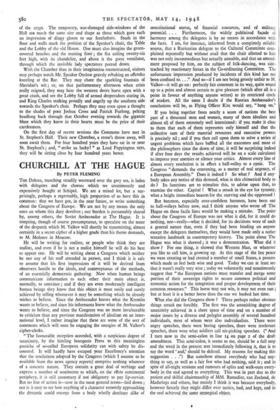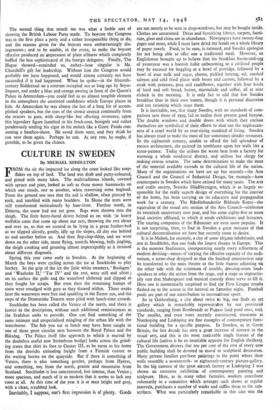CHURCHILL AT THE HAGUE
By PETER FLEMING
THE Dakota, marching steadily westward over the grey sea, is laden with delegates and the cheeses which we unanimously and expensively bought at Schipol. We are a mixed lot, but a sur- prisingly, perhaps a regrettably, high proportion of us have this in common: that we have got, in the near future, to write something about the Congress of Europe. We are not by any means the only ones on whom this duty devolves ; our burden is presumably shared by, among others, the Soviet Ambassador at The Hague. It is tempting, though of course presumptuous, to speculate on the tenor of the despatch which M. Valkov will shortly be transmitting, almost certainly in a secret cipher of a higher grade than his theme demands, to M. Molotov in Moscow.
He will be writing for realists, or people who think they are realists, and even if he is not a realist himself he will do his best to appear one. He will be writing about a Congress which neither he nor any of his staff attended in person, and I think it is safe to assume that his first impressions of it will be derived from observers hostile to the ideals, and contemptuous of the methods, of an essentially democratic gathering. Now when human beings communicate information to each other their main object is, normally, to convince ; and if they are even moderately intelligent human beings they know that this object is most easily and surely achieved by telling whomever it may be something which he already wishes to believe. Since the Ambassador knows what the Kremlin wants to believe, and since his informants know what the Ambassador wants to believe, and since the Congress was no more invulnerable to criticism than any previous manifestation of idealism on an inter- national level, I rather imagine that these are some of the sort of comments which will soon be engaging the energies of M. Valkov's cipher-clerks.
" The favourable reception accorded, with a suspicious degree of unanimity, by the hireling bourgeois Press to this meaningless pastiche of so-called European solidarity can with safety be dis- counted. It will hardly have escaped your Excellency's attention that the resolutions adopted by the Congress (which I assume to be available from the news agency reports) comprise nothing whatever of a concrete nature. They contain a great deal of verbiage and express a number of sentiments to which, on the effete continental periphery, it is still customary if not obligatory to pay lip-service. But no line of action is—save in the most general terms—laid down ; nor is it easy to see how anything of a character remotely approaching the dynamic could emerge from a body wholly destitute alike of
constitutional status, of financial resources, and of military potential. . . . Furthermore, the widely publicised facade of harmony among the delegates is by no means in accordance with the facts. I am, for instance, informed from a completely reliable source, that a Ruritanian delegate to the Cultural Committee com- plained repeatedly but without avail that the chair allotted to him was not only incommodious but actually unstable, and that an amend- ment proposed by him, on the subject of folk-dancing, was side- tracked by reactionary forces in the Co-ordinating Committee. The unfortunate impression produced by incidents of this kind has not been confined to...." And so—if I am not being grossly unfair to M. Valkov—it will go on: perfectly fair comment in its way, quite sound up to a point and almost certain to give pleasure (which after all is a point in favour of anything anyone writes) to its restricted circle of readers. All the same I doubt if the Russian Ambassador's conclusions will be, as Flying Officer Kite would say, " bang on."
If you bring together from nearly a score of nations the best part of a thousand men and women, many of them idealists and almost all of them extremely well intentioned: if you make it clear to them that each of them represents only himself and that the collective sum of their material resources and executive powers is precisely nil ; and if you then call upon them to solve a series of urgent problems which have baffled all the statesmen and most of the philosophers since the dawn of time, it will be surprising indeed if after four days the results achieved will be on a scale calculated to impress your enemies or silence your critics. Almost every line of almost every resolution is in effect a half-volley to a cynic. The Congress "demands the convening, as a matter of real urgency, of a European Assembly." Does it indeed ? So what ? And if any- body takes any notice of this demand, what is this chimerical body to do ? Its functions are to stimulate this, to advise upon that, to examine the other. Capital ! What a smack in the eye for tyranny, what a bright immediate beacon for the starving and the oppressed !
But batsmen, especially over-confident batsmen, have been out to half-volleys before now, and I think anyone who wrote off The Hague on these facile lines would be making a mistake. The point about the Congress of Europe was- not what it did, for it could do nothing, nor—really—what it decided, for its decisions were of such a general nature that, even if they had been binding on anyone except the delegates themselves, they would have made only a rather tentative landmark in contemporary history. The point about The Hague was what it showed ; it was a demonstration. What did it show ? For one thing, it showed that Western Man, or whatever you like to call him, is growing up. At this stage of the last peace we were creating or had created a number of small States, a process which made us feel both wise and good. Today we can at least see that it wasn't really very wise ; today we voluntarily and unanimously suggest that " the European nations must transfer and merge some portion of their sovereign rights to secure common political and economic action for the integration and proper development of their common resources." This horse may not win, it may not even run ; but at least it is a better horse than the one we backed last time.
What else did the Congress show ? Three perhaps rather obvious things struck me forcibly. The first was the astonishing degree of unanimity achieved in a short space of time and on a number of major issues by a diverse and polyglot assembly of several hundred individuals, most of whom were also individualists. There were angry speeches, there were boring speeches, there were irrelevant speeches, there were what soldiers call nit-picking speeches. (" And I turn now to the semi-colon in line 14 on page 2 of the draft amendment. This semi-colon, it seems to me, should be a full stop and the word in the present text immediately following it, that is to say the word ' and,' should be deleted. My reasons for making this suggestion . . .") But somehow almost everybody who had any- thing to say, as well as a fair few who had nothing, said it ; and in spite of all-night sessions and rumours of splits and walk-outs every- body in the end agreed to everything. This was in part due to the patient and skilful chairmanship of MM. Ramadier, van Zeeland, de Madariaga and others, but mainly I think it was because everybody, however fiercely they might differ over tactics, had, and kept, and in the end achieved the same strategical object. The second thing that struck me was what a feeble sort of showing the British Labour Party made. To boycott the Congress was in the first place a petty and a rather irresponsible thing to do, and -the reasons given for the boycott were embarrassingly dis- ingenuous ; and to be unable, in the event, to make the boycott effective produced an impression of plain silliness which completely baffled the less sophisticated of the foreign delegates. Finally, The Hague showed—reminded us, rather—how singular is Mr. Churchill's gift for leadership. Without him the Congress would probably not have happened, and would almost certainly not have succeeded if it had happened. When he spoke—in the fifteenth- century Ridderzaal on a rostrum occupied not so long ago by Seyss- Inquart, and under a blue and orange awning in front of the Queen's Palace in Amsterdam—you could feel as an almost tangible element in the atmosphere the unstinted confidence which Europe places in him. At Amsterdam he was almost the last of a long list of accom- plished speakers, but the eyes of the crowd strayed continually from the orators to gaze, with sheep-like but affecting reverence, upon this legendary figure hunched in his frock-coat, benignly and rather ponderously settling his cigar in his mduth like a Giant Panda con- suming a bamboo-shoot. He saved them once, and they think he can save them again.. Perhaps he can. At any rate, he ought, if possible, to be given the chance.































 Previous page
Previous page